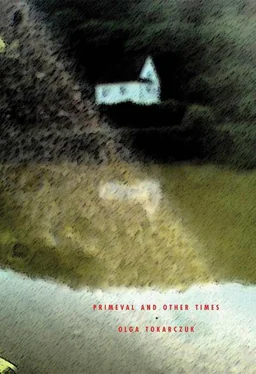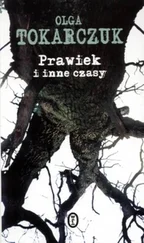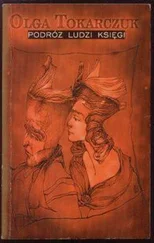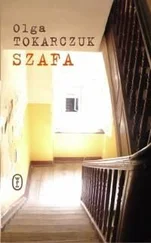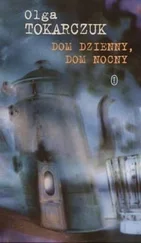Misia’s first memory was the sight of the ragged man on the road to the mill. Her father staggered as he walked, and then often cried at night, nestling against her mother’s breasts. So Misia treated him as her equal.
From then on she felt there was no difference between adult and child in anything that really mattered. Child and adult – they were transitory states. Misia watched closely to see how she herself was changing and how the other people around her were changing, but she didn’t know where it was all heading, what the aim of these changes was. In a cardboard box she kept mementoes of herself, her little self and then the bigger one – knitted baby bootees, a tiny cap as if made to fit a fist, not a child’s head, a little linen top, and her first little dress. Then she placed her six-year-old foot next to the knitted bootee and felt a sense of the fascinating laws of time.
Since her father’s return, Misia had started to see the world. Before then everything had been blurred and out of focus. Misia could not remember herself from before her father’s return, as if she hadn’t existed at all. She remembered individual objects. The mill had seemed enormous to her then, a monolithic mass with no beginning or end, no top or bottom. Afterwards she saw the mill differently, with her reason. It had meaning and form. It was the same with other things. Once, when Misia had thought “river,” it had meant something cold and wet. Now she could see that the river flowed to and from somewhere, and that the same river existed before and after the bridge, and that there were other rivers… Scissors – once they were a strange, complicated tool, difficult to make work, which Mama put to magical use. Ever since her father had sat down at the table, Misia could see that the scissors were a simple mechanism with two blades. She made something similar out of two flat sticks. Then for a long time she tried seeing things as they had formerly been again, but her father had changed the world forever.
THE TIME OF MISIA’S GRINDER
People think they live more intensely than animals, than plants, and especially than things. Animals sense that they live more intensely than plants and things. Plants dream that they live more intensely than things. But things last, and this lasting is more alive than anything else.
Misia’s grinder came into being because of someone’s hands combining wood, china and brass into a single object. The wood, china and brass made the idea of grinding materialise. Grinding coffee beans to pour boiling water on them afterwards. There is no one of whom it could be said that he invented the grinder, because creating is merely reminding yourself of what exists beyond time, in other words, since time began. Man is incapable of creating out of nothing – that is a divine skill.
The grinder has a belly made of white china, and in the belly an opening, in which a small wooden drawer collects the fruits of its labour. The belly is covered with a brass hat, with a handle ending in a bit of wood. The hat has a closing hole, into which the rattling coffee beans are poured.
The grinder was made in some factory workshop, and then ended up at someone’s house, where every morning it ground coffee. Hands held it, warm and alive. They pressed it to someone’s breasts, where under calico or flannel a human heart was beating. Then the impetus of war transferred it from a safe shelf in the kitchen to a box with other objects, into valises and sacks, into train carriages, in which people pushed ahead in panic-stricken flight from violent death. Like every other thing, the grinder absorbed all the world’s confusion: images of trains under fire, idle rivulets of blood, and abandoned houses, as a different wind played with their windows every year. It absorbed the warmth of human bodies going cold and the despair of abandoning the familiar. Hands touched it, and they all brushed it with an immeasurable quantity of thoughts and emotions. The grinder accepted them, because all kinds of matter have this capacity – to arrest whatever is fleeting and transitory.
Michał had found it far away in the East, and had hidden it in his army rucksack as a spoil of war. That evening when the soldiers stopped for the night he had sniffed its drawer – it smelled of safety, coffee, home.
Misia took the grinder outside to the bench in front of the house and turned the handle. Then the grinder ran lightly, as if it were playing with her. Misia watched the world from the bench, and the grinder turned and ground empty space. But one day Genowefa tipped a handful of black beans into it and told it to grind them. Then the handle no longer turned as smoothly. The grinder choked, and slowly, systematically, began to work and to creak. The playing was over. There was so much gravity in the grinder’s work that no one would have dared to stop it now. It became nothing but grinding. And then the grinder, Misia and the whole world were united by the odour of freshly ground coffee.
If you take a close look at an object, with your eyes closed to avoid being deceived by the appearances that things exude around themselves, if you allow yourself to be mistrustful, you can see their true faces, at least for a moment.
Things are beings steeped in another reality, where there is no time or motion. Only their surface can be seen. The rest, hidden elsewhere, defines the significance and meaning of each material object. A coffee grinder, for example.
The grinder is just such a piece of material infused with the concept of grinding.
Grinders grind, and that is why they exist. But no one knows what the grinder means in general. Perhaps the grinder is a splinter off some total, fundamental law of transformation, a law without which this world could not go round or would be completely different. Perhaps coffee grinders are the axis of reality, around which everything turns and unwinds, perhaps they are more important for the world than people. And perhaps Misia’s one single grinder is the pillar of what is called Primeval.
THE TIME OF THE PARISH PRIEST
Late spring was the most loathsome time of year for the parish priest. Around Saint John’s Day, the Black River brazenly flooded his meadows.
The priest was by nature impetuous and touchy about his dignity, so when he saw something of so little substance, so sluggish, so non-descript and vacuous, so elusive and cowardly taking away his meadows, he was filled with rage.
With the water, shameless frogs immediately appeared, naked and revolting, always climbing on top of one another and mindlessly copulating, emitting hideous noises as they did so. The devil must have had a voice like that: screeching, wet, hoarse with lust, and trembling with insatiable desire. And with the frogs, water snakes appeared in the priest’s meadows, slithering and writhing in such a vile way that the priest instantly felt unwell. At the very thought that such a long, slimy body might touch his boot he felt a shudder of disgust and a stab of cramp in his stomach. The image of the snake would sink into his memory for a long time after, ravaging his dreams. There were also fish in the flooded areas, and to these the priest had a better attitude. The fish could be eaten, so they were good, God’s gift.
The river flooded the meadows for at most three short nights. After the invasion it rested, reflecting the sky in itself. It went on lolling about like that for a month. Under the water, all month long the lush grass rotted, and if it was a hot summer, a smell of rot and decay floated over the meadows.
From Saint John’s Day, every day the priest came to see the black river water flooding Saint Margaret’s daisies, Saint Roch’s bluebells, and Saint Clare’s herbs. Sometimes it seemed to him as if the innocent blue and white heads of the flowers, up to their necks in water, were calling out to him for help. He could hear their reedy little voices, like the tinkling of the hand bells during the Elevation. There was nothing he could do for them. His face went red as he clenched his fists helplessly.
Читать дальше
